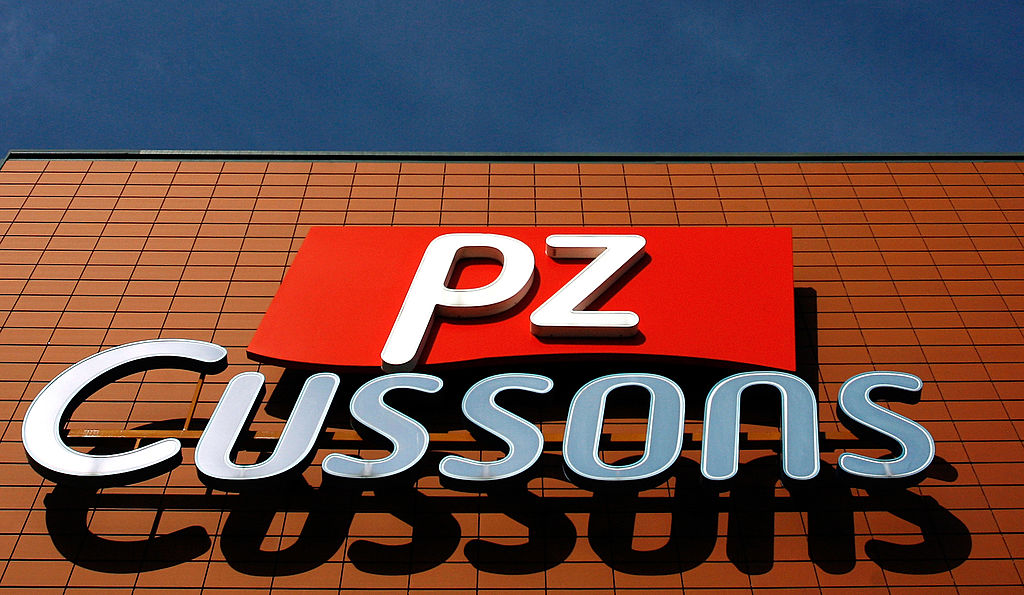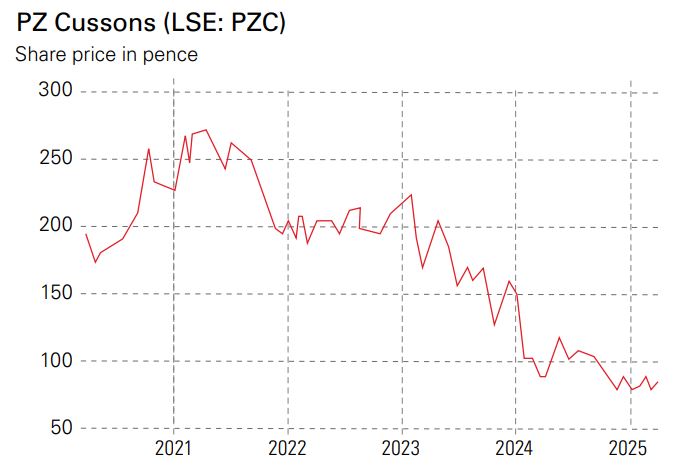PZ Cussons share price down 75% in last decade – why it's one to watch
Once-strong consumer-goods business PZ Cussons is out of favour with the market. That spells opportunity for investors, says Jamie Ward

Get the latest financial news, insights and expert analysis from our award-winning MoneyWeek team, to help you understand what really matters when it comes to your finances.
You are now subscribed
Your newsletter sign-up was successful
Want to add more newsletters?

Twice daily
MoneyWeek
Get the latest financial news, insights and expert analysis from our award-winning MoneyWeek team, to help you understand what really matters when it comes to your finances.

Four times a week
Look After My Bills
Sign up to our free money-saving newsletter, filled with the latest news and expert advice to help you find the best tips and deals for managing your bills. Start saving today!
Sometimes, the market gives up on a company. Investors become so disillusioned that they assume past difficulties will persist indefinitely. This appears to be the fate of PZ Cussons (LSE: PZC), a once-strong consumer-goods business that has faced multiple headwinds in recent years. Its share price is down by more than 75% in the last ten years and it has a valuation that suggests the market sees its struggles as the new normal. But is this truly the case, or does the stock now present an attractive contrarian opportunity?
PZ Cussons owns a range of personal-care, beauty and home-care brands. Its portfolio includes brands such as Carex, Imperial Leather and St. Tropez. These are repeat-buy, fast-moving consumer goods and are usually considered by investors to be dependable. Yet, despite the apparently defensive business, the company has suffered from a combination of external pressures and internal missteps that have weighed heavily on its performance.
The firm’s share price peaked in 2014. Arguably, at that time, the shares were too expensive and consequently declined modestly over the next five years. Since 2019, however, bigger problems have started to emerge. A major source of difficulty has been its exposure to Nigeria, which historically is an important market for the business – it started over 140 years ago as a trading company in the region. Currency devaluations, economic instability and high inflation have battered PZ Cussons’ operations in the region, eroding profitability and creating unpredictability in financial performance.
MoneyWeek
Subscribe to MoneyWeek today and get your first six magazine issues absolutely FREE

Sign up to Money Morning
Don't miss the latest investment and personal finances news, market analysis, plus money-saving tips with our free twice-daily newsletter
Don't miss the latest investment and personal finances news, market analysis, plus money-saving tips with our free twice-daily newsletter

Nigeria remains a large part of the business today, making up roughly a quarter of the business, and its struggles there have become a major source of difficulty within the company. The devaluation of the Nigerian currency (naira) in 2023 was a particularly painful blow, forcing PZ Cussons to take large foreign-exchange-related hits to earnings. Compounding this, weaker consumer confidence and supply-chain disruptions have made it harder to pass on cost increases to customers.
Aside from Nigeria, PZ Cussons has also faced more universal pressures. The inflationary environment has led to higher costs across its supply chain, while intense competition in its key divisions has limited its ability to raise prices without losing market share. At the same time, its UK operations have struggled with declining demand in some of its core product segments.
Recent years have, then, been tough, but PZ Cussons is not standing still. The management team, led by CEO Jonathan Myers since 2020, has been taking decisive steps to stabilise and revitalise the business. The company’s turnaround plan focuses on three key areas: brand strengthening, portfolio simplification, and cost efficiencies.
First, PZ Cussons has been refocusing on its core brands. Rather than spreading itself too thinly across a broad portfolio, it is doubling down on its strongest assets. This includes investing in marketing and innovation for flagship products such as Carex and St. Tropez, aiming to drive greater consumer loyalty and pricing power. The firm has already seen encouraging signs, with its beauty segment performing well in developed markets.
Second, management is streamlining operations by divesting non-core brands and markets. This is particularly important given the complexity and volatility associated with its Nigerian business. While Nigeria remains a strategic market, PZ Cussons is working to de-risk its exposure and reduce dependence on its historically volatile contributions to group profits. The recent sale of its Polish and Greek businesses is part of this broader rationalisation strategy.
Third, the company is implementing cost-saving initiatives to enhance efficiency. This includes optimising its supply chain, reducing overheads and improving operational execution. These efforts are particularly important in mitigating inflationary pressures and protecting profit margins.
Can PZ Cussons prove the doubters wrong?
The big question for investors is whether these efforts will be enough to return PZ Cussons to sustainable growth. Earnings are at a low ebb, and the company’s shares currently trade on a price/ earnings (p/e) ratio of around ten, which suggests the market remains sceptical. However, this valuation looks attractive if the turnaround strategy proves successful – if, in particular, PZ Cussons can navigate its Nigerian challenges more effectively. At the same time, a stronger performance from its premium beauty brands could provide a much-needed boost to group profitability, as these typically carry higher margins.
History suggests that consumer goods companies with strong brands and disciplined management can recover from difficult periods. PZ Cussons is not a broken business, rather, it is a company that has faced significant but surmountable hurdles. If management can deliver on its strategy, then today’s depressed share price may ultimately prove to be a compelling entry point.
As always, there are risks. Nigeria remains a complex market and macroeconomic headwinds could persist longer than expected. However, the company’s underlying brands still hold significant value, and its cost-cutting initiatives should provide resilience even in a tough environment.
The stock market is littered with firms that were once written off but later proved doubters wrong. PZ Cussons has work to do, but if it can execute its recovery plan, then the market’s current pessimism may turn out to be misplaced. For brave investors, this could be an opportunity to buy a recovering consumer goods company at an undemanding valuation. This is one to watch. Any signs of a return to the good times are to be taken as a buying opportunity.
This article was first published in MoneyWeek's magazine. Enjoy exclusive early access to news, opinion and analysis from our team of financial experts with a MoneyWeek subscription.
Get the latest financial news, insights and expert analysis from our award-winning MoneyWeek team, to help you understand what really matters when it comes to your finances.
Jamie is an analyst and former fund manager. He writes about companies for MoneyWeek and consults on investments to professional investors.
-
 Can mining stocks deliver golden gains?
Can mining stocks deliver golden gains?With gold and silver prices having outperformed the stock markets last year, mining stocks can be an effective, if volatile, means of gaining exposure
-
 8 ways the ‘sandwich generation’ can protect wealth
8 ways the ‘sandwich generation’ can protect wealthPeople squeezed between caring for ageing parents and adult children or younger grandchildren – known as the ‘sandwich generation’ – are at risk of neglecting their own financial planning. Here’s how to protect yourself and your loved ones’ wealth.
-
 Three key winners from the AI boom and beyond
Three key winners from the AI boom and beyondJames Harries of the Trojan Global Income Fund picks three promising stocks that transcend the hype of the AI boom
-
 RTX Corporation is a strong player in a growth market
RTX Corporation is a strong player in a growth marketRTX Corporation’s order backlog means investors can look forward to years of rising profits
-
 Profit from MSCI – the backbone of finance
Profit from MSCI – the backbone of financeAs an index provider, MSCI is a key part of the global financial system. Its shares look cheap
-
 'AI is the real deal – it will change our world in more ways than we can imagine'
'AI is the real deal – it will change our world in more ways than we can imagine'Interview Rob Arnott of Research Affiliates talks to Andrew Van Sickle about the AI bubble, the impact of tariffs on inflation and the outlook for gold and China
-
 Should investors join the rush for venture-capital trusts?
Should investors join the rush for venture-capital trusts?Opinion Investors hoping to buy into venture-capital trusts before the end of the tax year may need to move quickly, says David Prosser
-
 Food and drinks giants seek an image makeover – here's what they're doing
Food and drinks giants seek an image makeover – here's what they're doingThe global food and drink industry is having to change pace to retain its famous appeal for defensive investors. Who will be the winners?
-
 Barings Emerging Europe trust bounces back from Russia woes
Barings Emerging Europe trust bounces back from Russia woesBarings Emerging Europe trust has added the Middle East and Africa to its mandate, delivering a strong recovery, says Max King
-
 How a dovish Federal Reserve could affect you
How a dovish Federal Reserve could affect youTrump’s pick for the US Federal Reserve is not so much of a yes-man as his rival, but interest rates will still come down quickly, says Cris Sholto Heaton